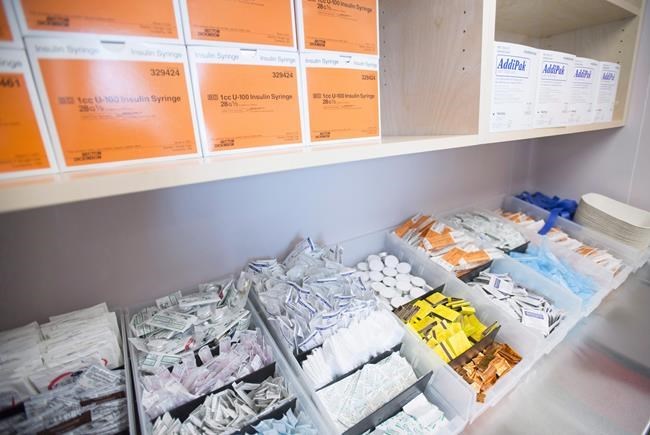
British Columbia's auditor general has released a report on two key government programs aimed at curbing the death toll from the toxic-drug crisis. Drug injection supplies are pictured inside the Fraser Health supervised consumption site in Surrey, B.C., Tuesday, June 6, 2017. THE CANADIAN PRESS/Jonathan Hayward
Republished March 19, 2024 - 3:39 PM
Original Publication Date March 19, 2024 - 1:56 PM
VICTORIA - British Columbia's auditor general has released audits on two key government programs aimed at curbing the death toll from the toxic-drug crisis. The first report examined the implementation of overdose prevention and supervised consumption services, while the second looked at how the initial phase of the prescribed safer-supply program was set up and monitored.
Both reports provided recommendations to B.C.'s Health and Addictions ministries, which lead the province's response to the toxic-drug emergency. Here are some highlights.
Chapter 1: An audit of implementation of overdose prevention and supervised consumption sites
This report found the ministry:
— monitored performance of sites
— publicly reported on implementation of services
— adjusted funding when necessary
Deficiencies:
— operational guidance lacked minimum service standards and did not always reflect consultations with health authorities, Indigenous people or those with lived experience
— barriers to provincewide implementation were not addressed
— deficiencies in target setting and evaluation
Recommendations:
1. The ministries collaborate with health authorities, service providers and Indigenous Peoples to develop minimum-level standards for overdose prevention sites, and update guidance to ensure services meet people's needs.
2. The ministries work with health authorities to develop targets, such as a specific number of sites and total consumption visits and establish deadlines to help ensure provincewide implementation.
3. The ministries work with health authorities, Indigenous Peoples and those with lived experience to evaluate all overdose prevention and supervised consumption sites.
4. The ministries work with health authorities to develop provincewide strategies to address opposition to new sites.
5. The ministries work with health authorities to develop guidelines that support opening more supervised consumption sites.
Ministry response:
— The ministries have accepted all five of the recommendations on service standards, target setting, evaluation and addressing barriers.
"Harm reduction is an integral component of the substance use system of care. It focuses on keeping people safe from injury or death," auditor general Michael Pickup said.
"A new provincewide evaluation of overdose prevention and supervised consumption services is needed as the last one was done in 2021. The toxic drug supply and other factors have changed."
Chapter 2: An audit of the initial implementation of prescribed safer supply
This report found the ministry:
— developed a data-collection framework
— monitored and adjusted funding
— initiated an evaluation of prescribed safer supply
Deficiencies:
— The ministries didn’t develop or implement strategies to address barriers to implementation, such as rural access to the program, health-care providers' hesitancy over prescribing the drugs and whether the drugs being offered were appropriate.
— The ministries didn’t effectively report publicly on the performance of prescribed safer supply.
Recommendations:
1. That the ministries develop a plan to address barriers to safer supply that includes working with health authorities to define responsibilities and targeted engagement with rural and remote communities to determine if implementation is feasible.
2. That the ministries report regularly to the public and health sector on whether the prescribed safer-supply program is working.
Ministry response:
— The ministries accepted both recommendations.
Mental Health and Addictions Minister Jennifer Whiteside: "We will continue to take action to expand mental health and addictions services in communities across B.C., including treatment and recovery, early intervention, and services that keep people alive and connect them to care, so we can turn the tide on this public health crisis.”
Pickup: "For the prescribed safer supply program, we found that the ministries' collaboration with health sector partners and public reporting was insufficient."
This report by The Canadian Press was first published March 19, 2024.
News from © The Canadian Press, 2024